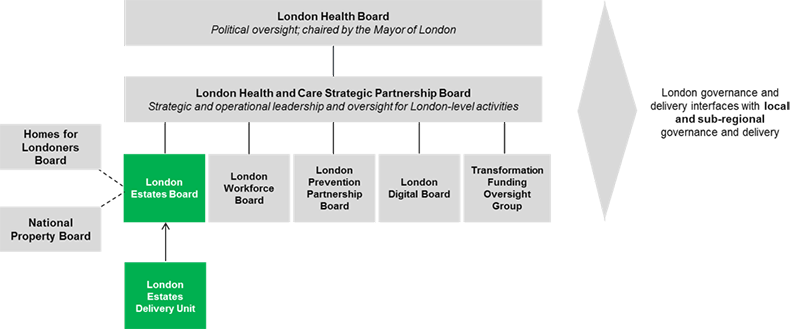Frequently asked questions
The London Estates Board formed in December 2016. Healthy London Partnership is responsible for the delivery unit that supports it and which brings together the collective technical and professional expertise of constituent organisations across London.
Who will decide about the future of NHS owned buildings and land?
There are a number of organisations who make decisions about NHS owned buildings and land. Some of these will have frequent contact with Londoners including hospital trusts (the largest landowners) and GPs. However, Londoners may be less familiar with some of these organisations. For example, two companies owned by the Department of Health (NHS Property Services and Community Health Partnerships) own or manage some of the NHS estate in London.
The London Estates Board (LEB) brings these organisations together with shared aims: to make vast improvements in the way NHS buildings and land are used and – where these are surplus to requirements – to release money to reinvest in London’s health and care system. Legally, different organisations will remain accountable for different decisions. However, the LEB enables better informed and more speedy and transparent decisions.
The LEB will not take estate decisions away from those who provide the services – it is recognised that these organisations (supported by their local commissioners) are in the best position to understand the needs of their service users and corresponding estate requirements.
The LEB will do the following:
- It will encourage and support those who provide services to Londoners to work in a more collaborative way so that land – and money made from the sale of land – is used in a way that best serves the local community. This could include supporting a number of service providers to physically join up services, so Londoners can access more help, support and advice in one place. The membership (including the GLA and local government) also allows NHS organisations to access resources and expertise that may not have previously been available to them, and help them develop innovative solutions to ensure they have the premises they need. This is particularly important at a time where we know that national capital is scarce. Plans for the use of land will continue to be developed locally by those responsible for providing health and care services, in collaboration with service users, staff and local communities.
- In some cases, the law or government policy means that decisions cannot be made locally. For example, some hospital trusts will be required to prepare a business case which explains how they will use the money they get from selling land. These business cases will then need approval from NHS England and/or NHS Improvement and sometimes also the Department of Health and HM Treasury. These processes are in place to ensure that best use is being made of public money, but can be lengthy and create uncertainty for the land owners. The membership of the LEB provides a way for these decisions to be taken with greater transparency and acceleration, informed by views and expertise from across the city’s health and care partners.
Will the Mayor be making decisions about NHS owned estate?
The LEB brings together organisations from across London who have an interest in estates. The full membership can be found in the operating framework. This includes representatives from the Greater London Authority land and housing teams. The Mayor is not a member of the LEB but, through the London Health Board – which he chairs – has oversight of the work of the Board. The Mayor/GLA already have a role to play in some decisions about NHS estate and will work in partnership with NHS organisations to support release of land and delivery of estate strategies where appropriate. The views of the GLA representatives on the LEB will help inform wider decision-making processes in a way that has not happened previously. This is not a case of moving decisions from one organisation to another but taking these decisions together.
Will all the money from the sale of land stay in London? Who will spend it?
Through the Memorandum of Understanding (MoU), it has been agreed that money from the sale of land owned by NHS Hospital Trusts and Foundation Trusts will stay in London, subject to some conditions. The MoU describes an approach which sees Trusts work with other local health and care organisations to look at how their combined estate can best serve the local community. The LEB has a role in collating these local plans to develop a single London capital plan to inform the use of sale proceeds within London. This process enables all organisations and the public to have confidence that the MoU commitments will be implemented in a way which is of greatest benefit to Londoners.
Will there be more new houses built as a result of this change?
The approach described above encourages organisations to look outside their own priorities, needs and estate and consider how the wider public estate can best serve the local community. Where land is surplus to NHS requirements, the LEB will enable it to be released more quickly in order that it can be put to better use and the proceeds of sale can be reinvested into health and care. Surplus land could be used for housing, including for health and care workers.
How does the London Estates Board fit with wider governance in London?

